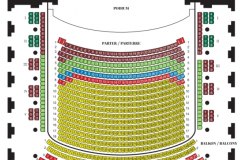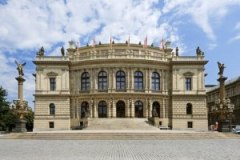Czech Philharmonic
Mo | Tu | We | Th | Fr | Sa | Su |
Program and cast
6 and 7 November 2025
Evgeny Kissin | piano
Elim Chan | conductor
Czech Philharmonic
Programme
Maurice Ravel - Mother Goose, suite for the orchestra (16')
Sergei Prokofiev - Piano Concerto No. 1 in D flat major, Op. 10 (16')
Intermission
Edward Elgar - Variations on an Original Theme, Op. 36 "Enigma Variations" (31')
16 and 17 November 2025 - Velvet Revolution Concert
Lucy Crowe | soprano
Okka von der Damerau | mezzo-soprano
Prague Philharmonic Choir
Lukáš Vasilek | choirmaster
Sakari Oramo | conductor
Czech Philharmonic
Programme
Gustav Mahler - Symphony No. 2 in C minor “Resurrection”
26, 27 and 28 November 2025
Brian Mulligan - The Prisoner
Ángeles Blancas Gulín - The Mother
Valentyn Dytiuk - The Gaoler / The Grand Inquisitor
Prague Philharmonic Choir
Simon Halsey | choirmaster
Víkingur Ólafsson | piano
Antonio Pappano | conductor
Czech Philharmonic
Programme
Luigi Dallapiccola - Il prigioniero (The Prisoner), a concert performance of the one-act opera (Czech premiere)
Ludwig van Beethoven - Piano Concerto No. 5 in E flat major, Op. 73 “Emperor”
3, 4 and 5 December 2025
Josef Špaček | violin
Václav Petr | cello
Thomas Adès | conductor
Czech Philharmonic
Programme
Ferruccio Busoni - Tanzwalzer, op. 53, BV 288
Pierre Boulez - Messagesquisse
György Kurtág - Petite musique solennelle – En hommage à Pierre Boulez 90 (Czech premiere)
Thomas Adès - Air – Homage to Sibelius for violin and orchestra (Czech premiere)
Thomas Adès -The Exterminating Angel Symphony (Czech premiere)
Maurice Ravel -La Valse
10, 11 and 12 December 2025
Amihai Grosz | viola
Czech Philharmonic Youth Orchestra*
Simon Rattle | conductor
Czech Philharmonic
The Czech Philharmonic Youth Orchestra is playing Berlioz’s symphony Harold in Italy. *
Programme
Hector Berlioz - Harold in Italy, symphony with solo viola, Op. 16
Witold Lutosławski - Chain III (Czech premiere)
Ludwig van Beethoven - Symphony No. in 3 in E flat major, Op. 55 “Eroica”
17, 18 and 19 December 2025
Magdalena Kožená | mezzosoprano
Prague Philharmonic Choir | women’s choir
Lukáš Vasilek | choirmaster
Simon Rattle | conductor
Czech Philharmonic
Programme
Claude Debussy - Nocturnes, L 98
Olivier Messiaen - Poèmes pour Mi, book two
Gustav Mahler - Symphony No. 4 in G major
31 December 2025 and 1 January 2026 - New Year’s Eve Concert of the Czech Philharmonic
Barbora Trnčíková | oboe
Kateřina Javůrková | French horn
Walter Hofbauer | trumpet
Robert Kružík | conductor
Czech Philharmonic
Marek Eben | host (only 1. Jan 2026)
Programme
Dmitri Shostakovich - Festive Overture, Op. 96
Maurice Ravel - Alborada del gracioso
Paul Dukas - Villanelle for French horn and orchestra
Claude Debussy (arr. by André Caplet) - Clair de lune
Ennio Morricone - Gabriel’s Oboe, main theme from the film The Mission
Arturo Márquez - Danzón No. 2
Oskar Böhme - Tarantella “La Napolitaine” for trumpet and orchestra, Op. 25
Pietro Mascagni - Cavalleria rusticana, intermezzo from the opera
Leonard Bernstein - Candide, overture to the operetta
7, 8 and 9 January 2026
Giulia Semenzato | soprano
Helen Charlston | alto
Patrick Grahl | tenor
Ashley Riches | bass
Prague Philharmonic Choir
Lukáš Vasilek | choirmaster
Czech Philharmonic Youth Orchestra*
Giovanni Antonini | conductor
Czech Philharmonic
The Czech Philharmonic Youth Orchestra is playing Beethoven’s Symphony No. 4. *
Programme
Ludwig van Beethoven - Symphony No. 4 in B flat major, Op. 60
Wolfgang Amadeus Mozart - Requiem in D minor, K 626
14, 15 and 16 January 2026
Jan Fišer | violin
Václav Petr | cello
Karolina Pancernaite | piano
Giovanni Antonini | recorder, conductor
Czech Philharmonic
Programme
Ludwig van Beethoven - Triple Concerto for violin, cello, piano, and orchestra in C major, Op. 56
Antonio Vivaldi - Concerto No. 3 in D major “Il Cardellino”, Op. 10
Joseph Haydn - Symphony No. 54 in G major, Hob I:54
28, 29 and 30 January 2026
Marie-Ange Nguci | piano
Stéphane Denève | conductor
Czech Philharmonic
Programme
Albert Roussel - Bacchus and Ariadne, Ballet Suite No. 2, Op. 43
Maurice Ravel - Piano Concerto for the Left Hand
Guillaume Connesson - Céléphaïs, Part I of the orchestral composition Les Cités de Lovecraft (Czech premiere)
George Gershwin - An American in Paris
4, 5 and 6 February 2026
Bryce Dessner | electric guitar
David Chalmin | electric guitar
Jakub Hrůša | conductor
Czech Philharmonic
Programme
Josef Suk - Triptych, Op. 35; Meditation on the Old Czech Chorale ‘St. Wenceslas’, Op. 35a; Legend of the Dead Victors, Op. 35b; Towards a New Life, Op. 35c
Bryce Dessner - St. Carolyn by the Sea (Czech premiere)
Benjamin Britten - Four Sea Interludes from the opera Peter Grimes
Josef Suk - Praga, symphonic poem for large orchestra, Op. 26
11, 12 and 13 February 2026
Augustin Hadelich | violin
Jakub Hrůša | conductor
Czech Philharmonic
Programme
Josef Suk - Tale of a Winter’s Eve, Op. 9
Jean Sibelius - Violin Concerto in D minor, Op. 47
Jean Sibelius - The Oceanides, Op. 73
Josef Suk - Fairy Tale, a suite from incidental music to Zeyer’s fairy-tale drama Radúz and Mahulena, Op. 16
18, 19 and 20 February 2026
Fleur Barron | mezzo-soprano
Semyon Bychkov | conductor
Czech Philharmonic
Programme
Felix Mendelssohn Bartholdy - Symphony No. 4 in A major, Op. 90 “Italian”
Gustav Mahler - Kindertotenlieder
Richard Wagner - Tannhäuser, overture to the opera
18, 19 and 20 March 2026
Sol Gabetta | cello
Stefanie Irányi | soprano
Martin Mitterrutzner | tenor
Jongmin Park | bass
Semyon Bychkov | conductor
Czech Philharmonic
Programme
Edward Elgar - Cello Concerto in E minor, Op. 85
Igor Stravinsky - Pulcinella, a concert performance of the ballet music
25, 26 and 27 March 2026
Nicola Benedetti | violin
Cristian Măcelaru | conductor
Czech Philharmonic
Programme
Wynton Marsalis - Violin Concerto in D major (Czech premiere)
Bohuslav Martinů - Symphony No. 1, H 289
1 and 2 April 2026 - 130th Anniversary Celebration Concert
Semyon Bychkov | conductor
Czech Philharmonic
Programme
Antonín Dvořák - Symphony No. 9 in E minor, Op. 95 – I. Adagio. Allegro molto (10')
Bedřich Smetana - The Bartered Bride, Overture (7')
Antonín Dvořák - Symphony No. 9 in E minor, Op. 95 – II. Largo (10')
Bedřich Smetana - The Moldau (Vltava), symphonic poem from the cycle My Homeland (Má vlast) (12')
8, 9 and 10 April 2026
Jan Mráček | violin
Emanuel Ax | piano
Semyon Bychkov | conductor
Czech Philharmonic
Programme
Antonín Dvořák - Violin Concerto in A minor, Op. 53
Johannes Brahms - Piano Concerto No. 1 in D minor, Op. 15
6, 7 and 8 May 2026
Anastasia Kobekina | cello
Semyon Bychkov | conductor
Czech Philharmonic
Programme
Henri Dutilleux - Métaboles
Bryce Dessner - Cello Concerto taking the form of a tone poem (European premiere)
Igor Stravinsky - The Rite of Spring
Rudolfinum
The Rudolfinum, one of the most noteworthy buildings in Prague, was built between 1876 and 1884 according to the designs of architects Josef Zítek and Josef Schulze. Originally intended as a multipurpose cultural building in Prague, the Rudolfinum was inagurated on February 7, 1885. It carried out its mission until 1919, when it was converted to the House of Commons of the Czechoslovak Republic. Concert activity was restored to the Rudolfinum during the German occupation, but full rehabilitation, particularly of the gallery, did not take place until 1992. After a general reconstruction by architect Karel Prager in 1992, the Rudolfinum became the home of the Czech Philharmonic and the Rudolfinum Gallery.
Dvorana – Ceremony Hall
The central space in the gallery portion of the Rudolfinum was designed by Josef Zítek and Josef Schulz as an entrance hall to the art gallery. After 1918, however, this space was converted into a parliamentary cafeteria, and after World War II it served as a gymnasium for the Prague Conservatory. At the end of the 1980s, Ceremony Hall was threatened with reconstruction – but plans to tear down the main staircase to make room for another concert hall did not go through, and the hall retained its original appearance. Of particular interest in Ceremony Hall are 25 empty spaces on its walls, which were originally intended to be filled in with frescos. The majority of the eminent Czech painters, however, boycotted the 1891 fresco competition in protest over the large number of German artists involved in the construction of the Rudolfinum.
Dvořák Hall
The Czech Philharmonic took the stage in this world-famous concert hall in 1896, performing for its first-ever concert under the baton of Antonín Dvořák himself. The hall remained a space for concerts and performances until 1918, at which time it became a boardroom for the new parliament of the Czechoslovak Republic. The stage and the organ loft became a tribunal (garnished with a statue of President T.G. Masaryk), from which parliamentary leaders presided over proceedings. The hall's original character (and purpose) was restored
in 1940–1942 according to a project conceived by Antonín Engel and Bohumír Kozák, and it has remained in this form through to the present. In accordance with Josef Zítek and Josef Schulz's original proposal, the central visual element in the hall is an organ, which was made in Frankfurt, Germany. During the hall's stint as a parliamentary meeting place, the organ was housed in Brno. When it returned to the Rudolfinum in 1940, its register was extended. Dvořák Hall's final update took place in 1992 when the entire Rudolfinum building underwent reconstruction.
When travelling by public transport, get off at the Staroměstská metro station (Line A), tram stop (trams nos. 17, 18 and 53) or bus stop (no. 207).
Parking is available at the underground parking facility on Jan Palach Square. The facility is not part of the Rudolfinum premises.

 EN
EN DE
DE IT
IT FR
FR ES
ES RU
RU JP
JP RO
RO
 Seating plan
Seating plan 